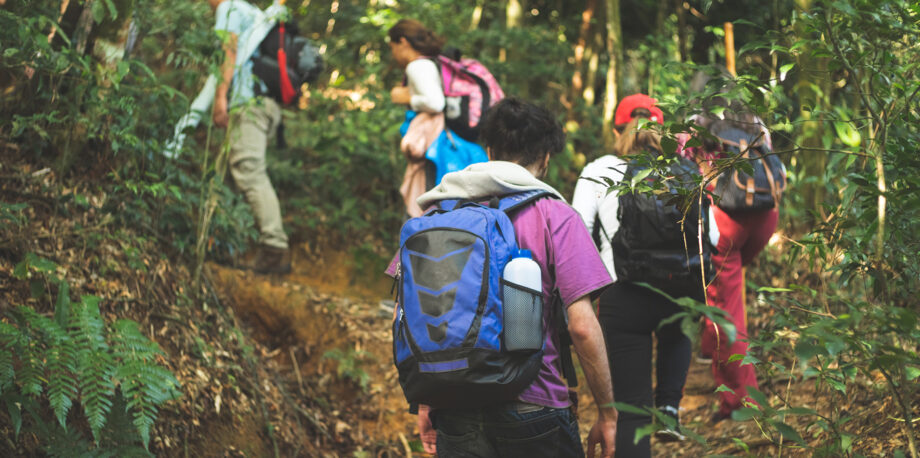July 1, 2020 — Rincon del Mar, a beachside hamlet on Colombia’s Caribbean coast, is part of a burgeoning industry that is helping to turn the tide for the country’s peacetime economy and its environmental conservation.
In 2010, Amauri Julio, a fisherman turned tour guide, joined other community members to form an environmental group to protect Rincon del Mar’s beaches and mangroves. During the day, he offers tours for snorkeling among tropical fish and corals and visiting idyllic Caribbean islands. Participants in afternoon tours view giant flocks of seabirds going to roost, aquatic reptiles and, as night falls, luminescent plankton in the lagoon surrounded by mangroves. With the country’s more-than-50-year armed conflict in the past, Julio says that more and more international tourists are visiting, providing a sustainable source of income for the village and their environmental projects.

Colombian fisherman-turned-tour-guide Amauri Julio relies on ecotourists to support local efforts to protect beaches and mangroves. Photo courtesy of Paola Carvajal
Growing concerns about climate change, however, could change that. One response has been “flight shaming,” using remorse to discourage travelers from flying. The movement started in Sweden in 2017 and gained international attention when climate activist Greta Thunberg crossed the Atlantic in a sailboat to attend the U.N. Climate Action Summit in New York in September 2019. Some conservationists and ecotourism providers are concerned that flight shaming may have negative unintended consequences, especially in developing countries where tourism is a key source of jobs, economic growth and conservation funding.
Places like Rincon del Mar depend heavily on tourism. And the Colombian government views tourism as a whole, which has grown some 300% since 2006, as the country’s “new petroleum” and is investing heavily in the blossoming industry.

Travel slowdowns caused by the Covid-19 pandemic are shining light on flight shaming’s possible impacts on ecotourism. Photo © iStockphoto.com | Joel Carillet
The COVID-19 pandemic is offering a preview of what could happen if flight-shaming caused air travel and international tourism to dry up. “If you want to see what happens when people stop flying to Africa or Asia, we can see it right now. With tourists gone, poachers are moving in and killing endangered species,” Costas Christ, a former senior director at Conservation International and founder of Beyond Green Travel, a sustainable tourism consultancy says in an email. Christ says he is concerned that with tourism companies and governments’ conservation budgets pummeled, previously protected natural habitat may be turned into cattle ranches. “That is what happens when tourists stop flying.”
Tourism With Benefits
There’s an important distinction to be made between nature tourism — the act of vacationing outdoors — and ecotourism, Christ says.
Nature tourism involves spending a holiday in natural places, “but that does not mean [travelers] are having a positive impact on nature,” Christ says. He points to Tayrona National Natural Park, also on Colombia’s Caribbean coast, as an example of where people visiting in large numbers damaged the natural environment by discarding trash, lighting fires and trafficking plants and animals.
Ecotourism, on the other hand, encapsulates principles and practices that ensure that tourists benefit both the environment and local communities. “Ecotourism was developed to make sure nature tourism did not destroy the very environment that tourists want to visit,” Christ says.
Liven Fernando Martinez Bernal, a professor at the National University of Colombia and an expert in tourism, economics and the environment, says that if the ecotourism industry can grow in an organized way with quality standards, it could generate impressive benefits. Bernal wrote his doctoral dissertation on the environmental impact of tourism in Colombia’s National Parks, looking at the post-conflict scenario and focusing his analysis on the economic impacts for local communities. He found that ecotourism doesn’t require a large capital investment, so rather than concentrating benefits in the hands of a few as often happens in the tourism industry, it can contribute to wealth distribution and economic development at the local level.

In Costa Rica, ecotourist activities like ziplining help bolster the business case for rainforest conservation. Photo © iStockphoto.com | THEPALMER
Costa Rica is a prime example. From the early 1940s to the 1980s, forest cover decreased from 77% of the country’s territory to 21%, mostly driven by the expansion of cattle ranching and production of crops like coffee and bananas. Facing an economic crisis in the early 1980s, the country looked to ecotourism as a way to diversify the economy while protecting the environment. Today more than 3% of its GDP comes from ecotourism. This, combined with a carbon tax on fossil fuels and payments for environmental services has meant that within 30 years, the country had more than doubled its forest cover.
Conscious Decisions
Experts suggest there is a balancing act at play between the desire to support local economies and conservation efforts and the need to address global climate change. Ecotourism clearly plays a role in protecting habitats and the biodiversity they support. Yet reducing the threat of climate change is key to their well-being, too.
Christ suggests that the answer may lie in finding a happy medium that accommodates both, particularly where they intersect. “The answer is not to stop travel,” he says, “but to get travel right.”
Editor’s note: Dimitri Selibas wrote this story as a participant in the Ensia Mentor Program. The mentor for the project was Rachel Cernansky.
Related Posts
Ensia shares solutions-focused stories free of charge through our online magazine and partner media. That means audiences around the world have ready access to stories that can — and do — help them shape a better future. If you value our work, please show your support today.
Yes, I'll support Ensia!





Yes, eco-travellers can offset their emissions, through forest protection and restoration, as does Costa Rica, though many environmental NGOs advocate against offsets.
There are no simple answers...